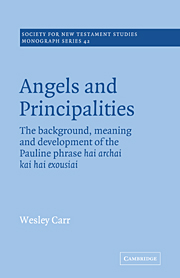 Angels and Principalities
Angels and Principalities Book contents
- Frontmatter
- Contents
- Preface
- Abbreviations
- General Introduction
- PART 1 The Background to Paul's Thought on the Powers
- PART 2 Exegesis of Pauline Texts
- PART 3 The post-Pauline development
- 6 Texts within the New Testament
- 7 Ignatius of Antioch
- 8 The angelomorphic Christology of early Jewish Christianity
- 9 The Greek apologists
- 10 Clement of Alexandria
- 11 The influence of gnosticism
- 12 Origen
- Conclusion to Part 3
- PART 4 Final Remarks
- Notes
- Select Bibliography
- Index
8 - The angelomorphic Christology of early Jewish Christianity
Published online by Cambridge University Press: 06 January 2010
- Frontmatter
- Contents
- Preface
- Abbreviations
- General Introduction
- PART 1 The Background to Paul's Thought on the Powers
- PART 2 Exegesis of Pauline Texts
- PART 3 The post-Pauline development
- 6 Texts within the New Testament
- 7 Ignatius of Antioch
- 8 The angelomorphic Christology of early Jewish Christianity
- 9 The Greek apologists
- 10 Clement of Alexandria
- 11 The influence of gnosticism
- 12 Origen
- Conclusion to Part 3
- PART 4 Final Remarks
- Notes
- Select Bibliography
- Index
Summary
There is sufficient evidence among early Jewish Christian writings of the association of Christ with the notions that are in the OT connected with angels for us to postulate an ‘angelomorphic’ Christology. This word is chosen in preference to the more usual ‘angel-Christology’ (Engelchristologie) in order to accommodate the criticisms of Martin Werner's thesis that there was a late Jewish angel-messianology, which the early Jewish Christians converted into an angel Christology. Some early Christians, however, certainly took up some references to the angel of the Lord in the OT and applied them to Christ. A classic statement of this approach, which clearly demonstrates both the method that was adopted and the possible conclusion that might be reached, may be found in Justin, Dial. 126. 1f, in which a list of OT references, including one to ‘the Angel of Great Counsel’, is applied to Christ. The fluctuation in certain OT texts between the person of God himself and the angels was a point of growth for the angelomorphic Christological ideas of early Jewish Christianity. This was a means both of interpreting the OT in the light of the Christian revelation and of according to Christ a more than merely human status. The major exception to this tendency is found in Ebionite Christianity, which seems to have used a strictly angelic conception of Christ in order to establish a psilanthropic Christology.
The Shepherd of Hermas
Among the most significant texts in this area of thought is the Shepherd of Hermas.
- Type
- Chapter
- Information
- Angels and PrincipalitiesThe Background, Meaning and Development of the Pauline Phrase hai archai kai hai exousiai, pp. 143 - 147Publisher: Cambridge University PressPrint publication year: 1981


